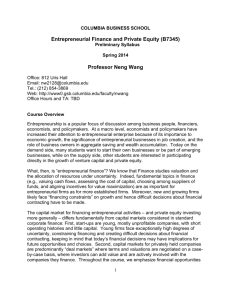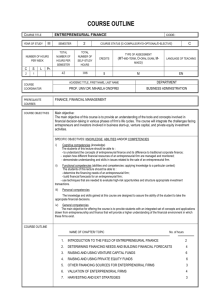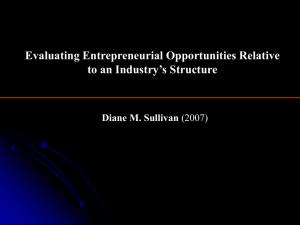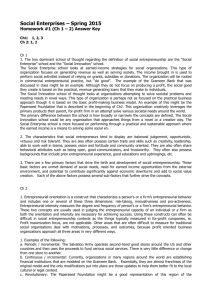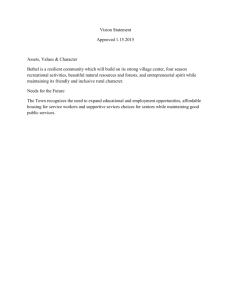Syllabus - Columbia University
advertisement
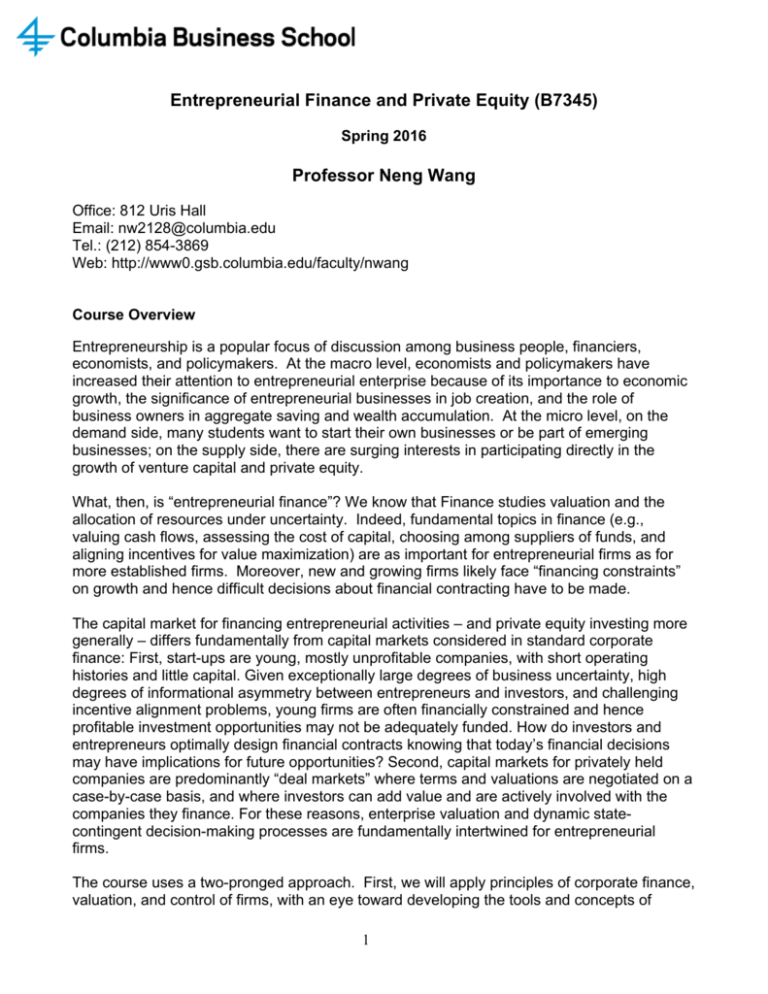
Entrepreneurial Finance and Private Equity (B7345) Spring 2016 Professor Neng Wang Office: 812 Uris Hall Email: nw2128@columbia.edu Tel.: (212) 854-3869 Web: http://www0.gsb.columbia.edu/faculty/nwang Course Overview Entrepreneurship is a popular focus of discussion among business people, financiers, economists, and policymakers. At the macro level, economists and policymakers have increased their attention to entrepreneurial enterprise because of its importance to economic growth, the significance of entrepreneurial businesses in job creation, and the role of business owners in aggregate saving and wealth accumulation. At the micro level, on the demand side, many students want to start their own businesses or be part of emerging businesses; on the supply side, there are surging interests in participating directly in the growth of venture capital and private equity. What, then, is “entrepreneurial finance”? We know that Finance studies valuation and the allocation of resources under uncertainty. Indeed, fundamental topics in finance (e.g., valuing cash flows, assessing the cost of capital, choosing among suppliers of funds, and aligning incentives for value maximization) are as important for entrepreneurial firms as for more established firms. Moreover, new and growing firms likely face “financing constraints” on growth and hence difficult decisions about financial contracting have to be made. The capital market for financing entrepreneurial activities – and private equity investing more generally – differs fundamentally from capital markets considered in standard corporate finance: First, start-ups are young, mostly unprofitable companies, with short operating histories and little capital. Given exceptionally large degrees of business uncertainty, high degrees of informational asymmetry between entrepreneurs and investors, and challenging incentive alignment problems, young firms are often financially constrained and hence profitable investment opportunities may not be adequately funded. How do investors and entrepreneurs optimally design financial contracts knowing that today’s financial decisions may have implications for future opportunities? Second, capital markets for privately held companies are predominantly “deal markets” where terms and valuations are negotiated on a case-by-case basis, and where investors can add value and are actively involved with the companies they finance. For these reasons, enterprise valuation and dynamic statecontingent decision-making processes are fundamentally intertwined for entrepreneurial firms. The course uses a two-pronged approach. First, we will apply principles of corporate finance, valuation, and control of firms, with an eye toward developing the tools and concepts of 1 entrepreneurial financial management and private equity investing. Second, we will use cases to illustrate how these tools and concepts may be applied in practice. We will analyze the cases from both the viewpoint of the entrepreneur and that of the investors to understand their motivations, objectives, and considerations. Entrepreneurial Finance and Private Equity investing are intrinsically linked. As an entrepreneur, you cannot negotiate effectively without understanding the investor’s motivations. As an investor, you cannot evaluate a potential investment opportunity without appreciating the entrepreneur’s perspective and incentives. Course Requirements and Grading This course relies heavily on class participation and requires substantial preparation for each session. It is essential that students complete all required readings and prepare for class discussions before each session. Group case discussions prior to class are strongly encouraged. Each study group (with four or fewer students) is required to submit a two-page (typed and double-spaced) write-up analyzing the case due at the beginning of each session. You may attach related numerical calculations to support your team’s two-page write-up of analysis and recommendation. Late submissions of the write-up will not be accepted. These case write-ups will comprise 1/3 of the course grade. To encourage class discussions and presentations, 1/3 of the course grade will be based on class participations broadly defined. I expect that each student can open a case discussion and also contribute to the ongoing class discussion. To facilitate class discussion and dynamics, please bring name cards to each session. The remaining 1/3 of the course grade will be based on an individual take-home case analysis. You will be given the exam on the last day of the class and it is due exactly two weeks from the distribution date. All requests for re-grades should be submitted, in writing, within two weeks of my returning cases to you. You need to submit a detailed description of your request. Course Materials and Information Required readings and cases will be made available to you in advance in class and will also be posted at the course website on CANVAS. Please regularly check the course website. There is no required textbook for the course. I will recommend various books and articles depending on the subjects. The following tentative outline serves as a guideline for our course. Due to time constraints, we will selectively cover the cases listed below. I will announce the details in advance. 2 Tentative Course Outline 0. Course overview and requirements 1. Part I: Valuation methods, real options, and entrepreneurial finance a. Lectures on standard valuation, VC, and real options methods b. Cases: Technical Data Corporation: Business Plan, Lotus, Genset, and Technical Data Corporation 2. Part II: Deal terms and exit a. Lectures on VC method and deal terms b. Cases: Trendsetter, Metapath, Apex Investment Partners (A), and ArthroCare 3. Part III: Leveraged buyouts a. Lectures on leveraged buyouts and agency problems b. Cases: John M. Case Company and O.M. Scott & Sons Company Leveraged Buyout 4. Part IV: Private Equity: GPs, LPs, incentives, fees, and exits a. Lectures on private equity from GP’s and LP’s perspectives b. Case: Weston Presidio Offshore Capital, Yale university investments office or Liquidating Harvard, CPPIB, Pawson, Grove Street Advisors, Altoona, Blackstone 5. Course Review 3
